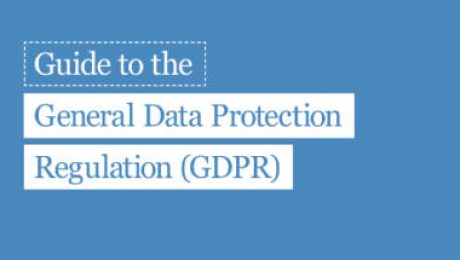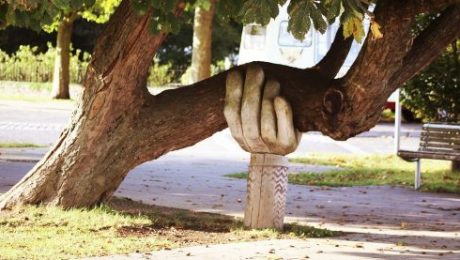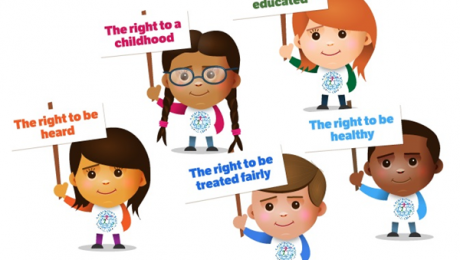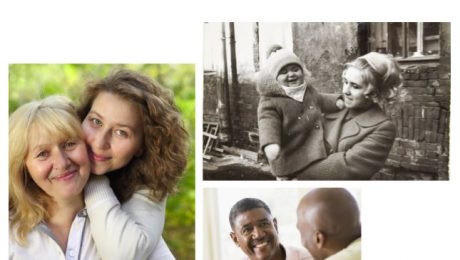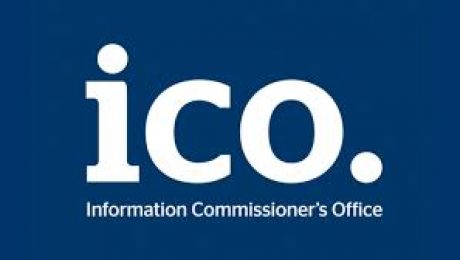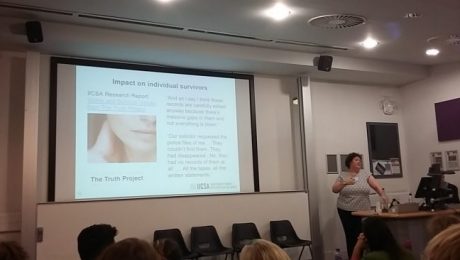Research in Practise Podcast
Darren Coyne of the Care Leavers Association and a member of our Campaign Group and John-george Nicholson share their personal stories of accessing their care files as adults. Both Darren and John-george were actively involved as research participants in the MIRRA project at UCL.
In these two podcasts, they talk about the emotional impact of receiving care files, the importance of child-centred recording, and provide suggestions of how practitioners can implement good recording.
The podcasts enable social workers and data governance officers to reflect on:
- What it means emotionally to access your care file.
- The experience of reading your care file, and its emotional impact.
- The significance of redaction and not hearing your voice within your care records.
- What child-centred record keeping would look like and why it is so important.
- The power and use of language within records, and recording positive ‘joyous moments’, and times of celebration not just negatives.
The second podcast sets out recommendations to take forward in your organisation or team, the importance of involving the child and young person in the process of creating records which will be central to their knowledge of their lives when they are adults.
Follow the link below to listen to the podcast.
- Published in General
ICO Guidance on access to records published
Guidance from the Information Commissioner’s Office about responding to an individual’s asking to see what personal data an organisation holds about them
The ICO in October 2020 issued guidance about how organisation should respond to a Subject Access Request. The link is here:
ACRCG responded to the consultation in detail (see our previous post with a link to our response to the consultation), and we are pleased that points we made have been taken up. Although the guidance is not specifically designed to meet the rights of adult care leavers, it has some useful messages for organisations to take on board.
Key messages in the guidance:
- it is a fundamental right of all individuals to know what personal information [data] the organisation holds about them
- a request for this information does not have to be in writing: organisations cannot insist on this but it may be useful to record that a request has been made
- the organisation cannot charge a fee and must provide the personal data within 20 working days
- names of person recording personal data about an individual in a professional capacity should be shared with the individual making the request.
We had made this point very strongly because it is most important and here’s the example given in the guidance:
“….it is reasonable for the council to provide the social worker’s personal data to the requester in response to the subject access request. However, the council must either have the consent of the family member, or consider whether it is reasonable to disclose their personal data without consent. If the council does not have consent, it is likely that it needs to reconcile the individual’s right of access in respect of any duty of confidence owed to the family member.”
It remains to be seen, of course, how the guidance will be interpreted by individual local authority departments and will, no doubt dictate further attention by our Association.
- Published in General
Government consult on care leavers experience of unregulated accommodation.
The government wants to know about care leavers’ experiences of living
in accommodation such as B&B, cheap hotels or hostels, where there are
no clear rules about the standard of the accommodation and the supports
for people placed there by the local authority. A number of key groups
working with adult care leavers and young people in care are demanding
that the government takes steps to make improvements to this unregulated
sector. The link below to the Article 39 website has more information
about this to enable you to contribute to the consultation. ACRCG
supports the groups working on this consultation and Care Leavers
Association is leading this work.
- Published in General
Defend children’s rights in care – scrap S. I. 445
ACRCG supports the many groups working to challenge the Government’s
action to suspend key fundamental rights and protections for children
and young people and adult care leavers.
The Government claims that the social care sector was demanding these changes to deal with the impact of the Corvid -19 pandemic as a matter of urgency. However, many groups representing children, young people, their families and adult care leavers were not consulted. There was no scrutiny or debate in Parliament about the changes. The Government has said that the changes will be in place until 25 September 2020 but it is possible that they could be extended. These significant changes erode and remove key
rights and protections. We join with the groups, including Care Leavers
Association, to demand that the Government withdraws the Regulation
which made these changes.
- Published in General
Announcing the launch of the Family Connect Website
Family Action’s FamilyConnect website is a new resource for adults who have been in care and or adopted. The information on the website is to assist them in finding answers to questions they may have about their origins, to help them on their journey to locate records relating to their adoption and care that may exist, and also to find birth family members.
The Family Connect website available at:
https://www.familyconnect.org.uk
It is planned that in due course the Family Connect website will be further developed to include information for birth relatives, professionals, and also for donor-conceived people providing funding becomes available. The website will be reviewed regularly so please let Julia Feast know if you spot anything that could be added or amended: Julia@feastconsultancy.co.uk
- Published in General
Information Commissioners Office consult on draft right of access guidance – ACRCG Response
Since the Data Protection Act 2018 was made law in May 2019, it has been necessary to publish guidance as to how its terms should be implemented, and, for instance how discretion ought to be exercised in order to provide good practise to the Data Subject. Our interest, of course, is limited to those who are, or were previously, in care, whereas the proposed guidance is of wider application to all.
The Information Commissioner’s Office issued a consultation for views on what form the guidance on access to records should take. One can read the consultation by clicking here
Although the guidance was going to be of general effect and not especially related to Care Records with their peculiar issues, we, as a Group, wanted to ensure that it took account of the special issues which those in care, and care leavers face when trying to access their records.
To read our response to the Guidance, you can read our whole response document by clicking the link below. In particular we made the following bullet points as well as provding detailed comments on the specific sections:-
“The issues that these people face include:
- defensive redaction of information particularly third-party information, often information which is already known to them
- defensive exercises of what should be an enabling discretion to provide third party information – both in decision making about getting consent from the third party and sharing that information without consent
- failure to understand what information on care records is not ‘protected’ information
- an overuse of the ‘serious harm’ test to withhold information, sometimes not properly informed by professional health advice about the individual’s current health and circumstances
- lack of sensitivity about explaining language, terms or professional jargon used in documents in their case file: this is particularly so for older adult carer leavers who are distressed by terms used
- lack of support to the individual during the SAR process and after their care records have been shared.”
Click here to read our response of a PDF File.
- Published in General
MIRRA Symposium, UCL, London
MIRRA stands for “Memory, Identity, Rights in Records, Access”, and has been conducting research into the process of Care Leavers applying for records, sometimes later in life. Today at the University College London was a symposium and conference, at which many fascinating speakers gave presentations.
After an introduction by Professor Elizabeth Shepherd, the opening address was given by Keynote Speaker Elizabeth Denham CBE, the UK Information Commissioner, who emphasised the role of the Information Commissioner’s Office in relation to record keeping, and preservation of personal data. She is the visiting Professor to the UCL where the conference was held. She explained that her history stems from being an archivist in Canada dealing with children from Residential Schools in British Columbia.
After coffee, various contributors to the project gave heart felt speeches about their experiences of applying for their records as care leavers. Victoria Hoyle over-viewed the project and what had been discovered from the research. Quotes from those who had gained access to their records were displayed on screen. The rawness of the various addresses from care leavers were very powerful, amusing, and passionate in equal measure. We also learned from academics and records officers about the practical process of the research and what lessons can be learned.
Victoria also played a very inspiring short film consisting of short quotes from the participants to the project and the research. It highlighted the major points such as how long and irksome the experience of applying for records was for care leavers, how it could be improved. Below you can replay the film.
After lunch we heard from campaigners, and researchers from the UK, Australia, and New Zealand who discussed the role of records in gaining justice for victims and survivors of abuse and neglect. Justine Rainbow from IICSA (Independent Inquiry into Child Sexual Abuse) gave us a summary of the experience of the lack of records in many of the modules currently being conducted as well as the experiences of those giving evidence to the Truth Project. Time and time again the institutions had destroyed useful evidence which IICSA would have liked to examine in order to prove the veracity of none recent allegations
Finally we heard about how a caring approach to records and record keeping could assist care leavers. Representatives from professional bodies, voluntary organisations and service providers talked about what they are doing to support care-experienced people’s rights to records. In particular we heard from the Darren Coyne of the Access to Records Campaign Group, who explained what legislation they are lobbying for to help care leavers over 25 who are looking for records. The Archives and Records Association fielded questions, The representative from British Association of Social Workers explained the desire to help by practitioners but the effect that austerity has upon the wish for improvements and developement. A representative of Family Action outlined a project to set up a website Family Connect in conjunction with Julia Feast, the purpose of which is to help put people in touch with their family from whom they have lost contact. We also heard from the Rees Foundation.
- Published in General
Work on Standards goes on, and a Podcast is planned
The Committee met today at the London Office of Simpson Millar solicitors to discuss where we were up to, and how we had progressed since the meeting with the Department of Education and Rob McPherson on 26th February 2019.
We were given the green light to draft some national standards which will apply to not only the under 25 year olds but to older care leavers as well. This was a useful concession because most of our beneficiaries are over 25.
Thanks go to Leonie Jordan and Julie Feast for drawing up some excellent draft standards, which are still a work in progress. We plan to send them to Rob McPherson at the DFE and Mathew Brazier from OFSTED, who, hopefully will approve them in outline with a view to making them National Standards. The plan is that they will become the hallmark against which any Local Authority being inspected by OFSTED will be judged against.
Once we have agreement on the Standards we will submit them to the DFE with a view to having them agreed in workshop format and translated into National Standards.
Also of interest is a plan by OFSTED to produce a PODCAST with the co-operation and involvement of Careleavers from the Care Leavers’ Association, which will be filmed in Manchester. It will include the experiences of the Adult Care Leavers of their route to access their own records, and an overview from OFSTED. This will then take the form of training and guidance for OFSTED inspectors. Watch this space.
We have achieved a lot in the last 12 months. The ACRCG moves from strength to strength thanks to the boundless energy and enthusiasm of our committee
- Published in General
Meeting with Department for Education went well
Baroness Young of Hornsey OBE led a meeting between Rob Macpherson MBE, the lead for children looked after, and ACRCG on 26 February 2019 to follow up the work done by participants at the Seminar at the House of Lords.
The DfE agreed in principle to the concept of Standards to mark a threshold of quality of services for all adult care leavers who ask to see their case records and they will support work we do to devise these. The Department’s remit is for care leavers up to 25 years and they agreed to support us in making links with other relevant government departments to achieve across government support for standards.
The DfE is due to revisit the Transition to Adulthood statutory guidance [which includes the guidance on access to records] and will see how to strengthen this and to improve links between the Ofsted inspection process of LA services and the guidance, particularly looking at the quality of the process to support care leavers now and the quality of care records for future care leavers.
This will link to the work the DfE is doing on the Care Leavers’ Covenant and the new duty on local authorities to set out their offer of services available to care leavers. We believe this was a successful recognition of the work done by participants in November and we are now working on draft standards to circulate for consideration.

- Published in General
MIRRA Research and lack of “love” in record keeping
We have been very fortunate as a group to have had the support of the MIRRA project, which appears in more detail in the Research Section of the site, where there is a fuller explanation of the 2 year research project being carried out by the University of Central London in close co-operation with several organisations such as the Care Leavers Association and ACRCG.
In this latest blog, Victoria Hoyle describes how she has discovered the issue that children in care feel unloved owing the bureaucratic process of record keeping, the form filling needed to obtain, for example, pocket money, and feeling that they are a statistic rather than a real human being.
To read the blog, click here


